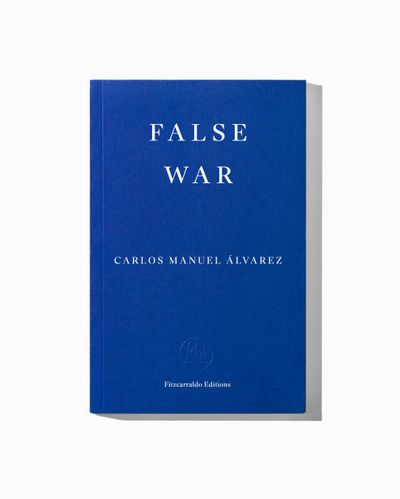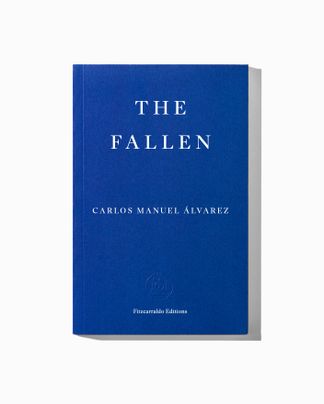The characters in False War are ambivalent castaways living lives of deep estrangement from their home country, stranded in an existential no-man’s land. Some of them want to leave and can’t, others left and never quite finished getting anywhere. In this choral novel, employing a dazzling range of narrative styles from noir to autofiction, Carlos Manuel Álvarez brings together a series of interconnected stories of the perennially displaced. From Havana to Mexico City to Miami, from New York to Paris to Berlin, whether toiling in a barber shop, lost in the Louvre, competing in a chess hall in Cuba, plotting a theft, or on a trip for émigré dissidents, these characters learn that while they may appear to be on the move, in reality they are paralysed, living in permanent stasis. With a fractured narrative that brilliantly reflects the disintegration that comes with uprooting, full of tenderness, disenchantment and melancholy, False War is an extraordinary novel that confirms Carlos Manuel Álvarez as one of the indispensable voices of his generation.

False War
Translated by Natasha Wimmer
French paperback with flaps, 268 pages
Published 28 August 2025
False War
Translated by Natasha Wimmer
0
MIAMI BEACH
The sound of airplanes cut across the interminable sky of Mexico City. I couldn’t hang around. I caught a flight to the border and crossed over in the South, riding buses for three days through Texas, Louisiana, Mississippi, and part of Alabama before funneling down into Florida. I saw the sick skies. Saw the streets and the fast-food joints and the primordial gas stations of America. Looking at the map, you drift west to east across the mainland until all of a sudden you drop into this hole.
My friend Elis put me up at her place, a two-bedroom apartment on an island north of Miami Beach. She’d come to get me in Tampa, in a white Toyota. We’d been neighbors as kids and here we were together in her car, bonded by a previous life. Twenty years later, she had chosen to honor that.
“You can stay here as long as you need to,” she said.
Back then, she hadn’t moved in yet with Fanboy and she wasn’t working at a gallery. She took a few sips of coffee and set the cup in the holder between us. She was dressed in black, dark circles under her eyes, and she wore a Swatch, also black.
Windows down.
“I don’t want to get in the way,” I said. “As soon as I’m on my feet I’ll find a place to rent.”
Elis gave me a skeptical look, as if somebody of my provenance would never get on his feet, or as if there was no such thing. And what did I mean, really?
“Sure,” she said, “but for now you can stay with me. You’ll love my roommates.”
Her kindness made her even more of a stranger. I mean, she wasn’t someone I knew. We were familiar from elementary school and around the neighborhood, our families had probably done each other a favor or two, but that was about it.
“How’s your father?”
“Sick,” I said.
“Your mother?”
“Gone.”
I felt uncomfortable sitting there, far from everyone. The wind was in my face and I decided to focus on that. Elis: one hand on the wheel, the other on her coffee cup. She drove confidently. I told her so, and that was all I said for a while.
“It’s what I do most,” she said. “Drive.”
The highway split the horizon in two. The car scissored forward, slicing the surface. Then I was out cold. Elis woke me underneath her building. We took the elevator up to her third-floor apartment halfway down a white hallway. Emergency stairs at the far end.
Through the door to the right, the kitchen. A guy our age was chopping vegetables on a wooden board by the sink. He stepped toward us, knife in hand. I thought he was going to say hello, but he stopped at the refrigerator. His hair was up in a tight knot. Thick black hair, already touched with gray, a few strands loose. Elis introduced us and hurried to the bathroom.
“S’up?” asked the Instrumentalist.
“Not much.”
“Make yourself at home, bróder.”
He wiped his hands on his apron and blew his nose into the sink.
I went into the living room. Put my backpack on the floor and sat on the edge of a sofa bed along one wall. It was where I’d be sleeping. There was another guy on the balcony, silhouetted against the orange light of Miami evenings. He was staring at something.
Elis came in, zipping her jeans. She led me to the balcony and introduced me to Juan. The thing Juan was staring at so intently was a map of the United States hanging from a nail.
He turned for a second and gave me a hug. His body was rigid, too stiff to turn easily, as if run through by a rod. He was tall and powerful. I thought I would snap in his arms.
“Welcome,” he said. “A new friend. New friends are always good.”
He smiled politely and went back to what he was doing. There was something off about him. You could say the same about other people, but with him you got the sense it was worse.
“He’s autistic,” Elis told me later, sprawled on the bed in her room.
She had changed into shorts, a baggy T-shirt, and ankle socks. I was still standing. I had been standing for more than an hour, even though Elis had said I could lie down, too, if I wanted.
Then the Instrumentalist burst in. He declared that I looked a mess, I needed fixing up. He hauled me a few miles away. Barber welcomed me and cut my hair. I asked him his name and he said that was his name: Barber.
INTIMATE LOVE LETTERS
Freddy Olmos drinks a glass of milk, unsweetened, and goes to bed. Floating in the tiny, vibrant room is the smell of all the men who’ve passed through since a woman whose face he can hardly remember rented him the apartment and left without saying goodbye.
Outside, a dark green taxi suddenly zigzags and flips over in the middle of the street. On his white bedsheet, half-asleep, Freddy Olmos is neither ugly nor beautiful. In his dream a group of people he knows cross themselves and plunge into the sea.
He gets up for work at the break of day and spends the morning selling stamps at the window of a bank beneath the Telecommunications building a few blocks from his apartment.
He brings home a pack of ten-peso stamps. His eyes are stinging. He sees bare walls and a glass table with a basket of plastic fruit.
He sits at the table and starts a letter that seems to have no end, writing for more than two hours. Every so often he goes to the kitchen and drinks water from the faucet. He fills several sheets of paper, puts them in an envelope, and applies one of the ten-peso stamps. He goes up to his room and leaves the letter on his night table. Then he starts up again, but his hand gets tired and he leaves the next letter half-finished.
(…)
‘Carlos Manuel Álvarez’s second novel is a hugely rewarding, polyphonic narrative of migration from Cuba. Through its characters’ rich and eccentric interior worlds, it gives articulation to people whose lives are often reduced to stereotypes and offers a new vision of migration….False War is a rich and capacious novel that has much to say about our contemporary moment.’
— Arin Keeble, Guardian
‘[In] a magisterial translation by Natasha Wimmer, [False War] examines the destinies of some of those Cubans who have fled the embattled island. It is a sprawling, polyphonic novel, fuelled by fury and empathy … it thrums with the truth of lived experience.’
— Ángel Gurría-Quintana, Financial Times
‘Álvarez has not fashioned a linear story, but braided these threads together into a polyphonic motet of voices that are alternately sardonic, weary and, above all, angry. It is a tribute to Wimmer’s peerless translation that she effortlessly captures their range, cadence, humour and rage…. False War is a poignant study of exile and exclusion, one that avoids the easy tropes of nostalgia and sentimentality: for Álvarez, exile is not an escape but a condition – permanent, internal and profoundly personal.’
— Frank Wynne, Irish Times
‘I was blown away by this novel. Nothing in the story is reducible. Its formal ambition is met by its execution, and the effect is staggering. Álvarez is an immense writer, a generational talent, and this, for me, is a generation-defining work.’
— Michael Magee, author of Close to Home
‘What happens when exile becomes style, and style becomes a kind of home? False War is that question asked with tenderness, fury and precision.’
— Carlos Fonseca, author of Austral
‘The dissidents, migrants and exiles of False War travel the world in search of some kind of refuge, but the cities they arrive in are places of purgatory, allegorical waystations of the permanently displaced, where everyone is an outsider, caught between landfalls, hurrying nowhere: “Brightness inside, darkness outside – until we crash.” This is a timeless and urgent work, in turns lyrical, hardboiled, tender, fragmented. It maps a way forward for the twenty-first century novel.’
— Jeet Thayil, author of Names of the Women
‘Human displacement is the storm surge of our century, yet we only hear of the crest. Behind that swell rush the sequels of individual souls on the move, swirling, unravelling, adrift. Álvarez reels us into those milieus with such engaging detail we can’t help becoming comrades to his fugitives. A brilliant work of enchantingly real voices.’
— DBC Pierre, author of Meanwhile in Dopamine City
‘This swirl of stories felt to me like a blue-collar version of Bolaño’s The Savage Detectives. Instead of poets, the drifting young people of False War seem like a chorus of the dispossessed, [their] ordinary lives portrayed with extraordinary intensity. It’s an incredibly poignant novel, and Álvarez is a writer who deserves a much wider audience in the English-speaking world.’
— Hari Kunzru, author of Blue Ruin
‘How do we recount the story of migration? Where does it begin and where does the journey end? Can a story have as a protagonist the very act of migrating due to exile or dissidence? In his new novel False War, Carlos Manuel Álvarez does exactly that: he puts the act of fleeing at the center, and does so through characters that find themselves in the midst of a radical transfer…. Time in this novel passes in a space that hasn’t yet been occupied – an impasse of open possibilities and discovery.’
— Julieta Venegas, Gatopardo
‘Álvarez paints this generational tapestry with lush and colorful prose that is exuberant and rich, with brushstrokes of infinite tenderness, occasional violence, humour tinged with nostalgia, and critique towards a society that squashed the dreams of its residents in its attempt to reach the goal of utopia. The pages that take place in Mexico City and Berlin can serve as a clear example of how we find ourselves with an uncommon narrator, capable of speaking in his own voice about the eternal topics of loss and exile.’
— Juan Cervera, Rockdelux
‘A seething race across countries and heads, from Mexico City’s congested streets to Berlin’s ghostly quiet, and on…. With exact translation by Natasha Wimmer, the book is like a collection of migrant tales, inextricably woven together in harmonious echoes – sometimes bound together by character, but often by similar preoccupations with displacement, identity, and desire. Alvarez’s writing is mesmerizing – his rhythm propulsive, his vision unflinching…. A compelling and necessary book that lingers in the mind long after reading.’
— Leo Boix, Morning Star
‘The prose is so immediate, so vital, you feel like you’re right there with the characters, wandering around town thirsty on a baking day or breaking into a house at night and raiding the fridge. In False War, we ride along with immigrant characters – who are all at varying stages of their journeys – including Fanboy, Barber, Instrumentalist, Juan, Elis and Rodriguez through first days, earthquakes, flatshares, nights out and prison stints. Translated here by Natasha Wimmer, Álvarez isn’t afraid to follow his impulses on pace or tone, whether that takes him to mystery, grief or comedy: there’s a particularly virtuosic section where Fanboy gets lost in the Louvre…. If you want a book that feels quite like nothing you’ve read before, try this.’
— Shortlist
‘In False War, defeat is like an ocean that connects stories from different narrators in different parts of the globe that all converge in the present, forming an archipelago in which the collective trauma of loss ends up emerging not as a national singularity but as a sign of the times, one of the scars of humanity today.’
— Nelson Cárdenas, Revista UNAM
Praise for The Fallen
‘A beautiful and painful novel that demonstrates the power of fiction to pursue the unutterable.’
— Alejandro Zambra, author of Childish Literature
‘A new Latin American literature is here: With precocious mastery of a paragon of narrative resources and an overwhelming sensibility, Carlos Manuel Álvarez portrays the only identity that truly matters – not the national one, but the human one.’
— Emiliano Monge, author of What Goes Unsaid
Praise for The Tribe
‘There is magic in these pages…. This book tells the actual story of Cuba as it exists today.’
— Jon Lee Anderson, author of Che Guevara
‘Álvarez is very good on the absurdist rituals of zombie totalitarianism…. The Tribe vividly explores the more offbeat milieus and people of an extended Cuba.’
— Lorna Scott Fox, Times Literary Supplement
Carlos Manuel Álvarez is the author of The Fallen and The Tribe, and has written for the New York Times, El País and the Washington Post. He was selected as one of the twenty best Latin American writers born in the 1980s at the Guadalajara Book Fair; he was included in the Bogotá39 list of the best Latin American writers under 40; and he was chosen by a panel of judges for inclusion in Granta’s second Best Young Spanish-Language Novelists issue. He is the recipient of the Anagrama Chronicle Prize for Los Intrusos and the Prix Carbet de la Caraïbe et du Tout-Monde for the French translation of his novel The Fallen.
Natasha Wimmer is the translator of nine books by Roberto Bolaño, including The Savage Detectives and 2666. Her recent translations include Nona Fernández’s Voyager and Álvaro Enrigue’s You Dreamed of Empires. She is a frequent contributor to the New York Review of Books and a visiting lecturer at Princeton University and Columbia University. She is the recipient of a PEN Translation Award and an Award in Literature from the American Academy of Arts and Letters.




